How Social Tagging Changes the Economics of Ecommerce was a geeky session that explained how a potent mix of “people like me” navigation and digital leverage can drive sales and profits + The secret to emerging markets?
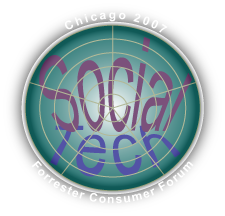 The Global Human Capital Journal’s coverage of the Forrester Consumer Forum 2007 continues with this session on social tagging. Before your eyes glaze over, bear with me and learn how this simple, revolutionary social technology can help your customers to help your business. Forrester’s Sarah Rotman Epps moderated a discussion with Brian Rosenblat, Online Retail Industry Lead, Endeca Technologies and Jay Shaffer, Vice President Marketing, PowerReviews, who represented companies that offer social tagging solutions, and they all shared numerous examples. The Global Human Capital Journal’s coverage of the Forrester Consumer Forum 2007 continues with this session on social tagging. Before your eyes glaze over, bear with me and learn how this simple, revolutionary social technology can help your customers to help your business. Forrester’s Sarah Rotman Epps moderated a discussion with Brian Rosenblat, Online Retail Industry Lead, Endeca Technologies and Jay Shaffer, Vice President Marketing, PowerReviews, who represented companies that offer social tagging solutions, and they all shared numerous examples.
This was one of the most “actionable opportunity” sessions of the conference: tagging is a relatively unknown, simple, yet transformational Web 2.0 phenomenon that will gain traction in 2008 and explode in 2009. If you aren’t doing it, you will be at a significant disadvantage to your competitors who do.
The Global Human Capital Journal published the overall conference […]
Will China’s Rise Lead to an Environmental Catastrophe? summarizes The Economist Chicago debate, examining the environmental fallout of the Chinese economic supernova—sibling rivalry rears its ugly head.
 In 2007, nary an RSS feed or the page of a newspaper (for those still inclined ,^) does not mention China’s exploding impact on the global stage: China is truly an economic supernova, and it is breaking almost any record for development that is laid before it. However, China’s breakneck development is accompanied by grave environmental fallout: for example, as the host of the Beijing 2008 Olympic Games, the city is designing extreme measures to ensure that the air is clean enough for the athletes to breathe. The chief culprit is coal, a key source for China’s insatiable need for electric power, and a resource that the country has in abundance. For key facts on China, I suggest The Economist’s Country Briefing or CSRA’s Emerging Markets category (in depth) or China tag (mentions). In 2007, nary an RSS feed or the page of a newspaper (for those still inclined ,^) does not mention China’s exploding impact on the global stage: China is truly an economic supernova, and it is breaking almost any record for development that is laid before it. However, China’s breakneck development is accompanied by grave environmental fallout: for example, as the host of the Beijing 2008 Olympic Games, the city is designing extreme measures to ensure that the air is clean enough for the athletes to breathe. The chief culprit is coal, a key source for China’s insatiable need for electric power, and a resource that the country has in abundance. For key facts on China, I suggest The Economist’s Country Briefing or CSRA’s Emerging Markets category (in depth) or China tag (mentions).
The Economist and WBEZ 91.5 FM presented an Oxford-style debate on the effect that China’s rise […]
A Paradoxical Proposition, Are People More Real Where They Live Their Dreams?—Zapped by Conventional Thinking
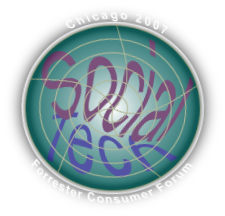 Gaming and virtual worlds like Second Life have been a hot topic due to their novelty and, where gaming is concerned, their Gen X and Gen Y demographics. However, early adopter marketers who have flocked to virtual worlds to create presences there have often been disappointed. Forrester’s Paul Jackson is a long-time follower of gaming and virtual worlds, and he gave a fascinating and valuable session on the status and best practices for how marketers can approach this new medium. He also gave a rough ROI picture of investing. Just like anything, if you approach virtual worlds with appropriate goals, you can benefit significantly. Gaming and virtual worlds like Second Life have been a hot topic due to their novelty and, where gaming is concerned, their Gen X and Gen Y demographics. However, early adopter marketers who have flocked to virtual worlds to create presences there have often been disappointed. Forrester’s Paul Jackson is a long-time follower of gaming and virtual worlds, and he gave a fascinating and valuable session on the status and best practices for how marketers can approach this new medium. He also gave a rough ROI picture of investing. Just like anything, if you approach virtual worlds with appropriate goals, you can benefit significantly.
An Overview of Games and Virtual Worlds
Jackson began with a history of virtual worlds and gaming, which are both inherently social (and usually sticky). Gaming began in the 1970s with multiuser Dungeons, and many early games were played on the VAX. The 1990s introduced 3-D graphics and VRML as well as massively multiuser games like Lineage, EverQuest and the World […]
Caterpillar CEO Pitches Free Trade to Business Leaders at Executives’ Club asks whether the U.S. is at turning point with global economy in the balance—A lack of courage?
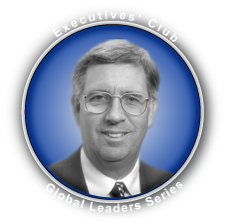 James W. Owens, Chairman and Chief Executive Officer of Caterpillar Inc., beseeched U.S. business and government leaders to find the courage to save free trade. The speaker at the Executives’ Club of Chicago’s Global Leaders Series, Owens addressed a packed house at the Hilton Chicago on 16 October 2007. His speech was immediately followed by the Club’s Technology Conference at which CIOs advised their peers on the emerging role of the CIO in the “networked economy 2.0.” James W. Owens, Chairman and Chief Executive Officer of Caterpillar Inc., beseeched U.S. business and government leaders to find the courage to save free trade. The speaker at the Executives’ Club of Chicago’s Global Leaders Series, Owens addressed a packed house at the Hilton Chicago on 16 October 2007. His speech was immediately followed by the Club’s Technology Conference at which CIOs advised their peers on the emerging role of the CIO in the “networked economy 2.0.”
A Ph.D. economist with extensive global management experience, Owens made a very convincing argument that the U.S. and the global economy are at a turning point. It is time for the U.S. to lead by example to assure the continuance of the free trade juggernaut that has produced so much wealth in the world. If it fails, the world stands before the prospect of sharply curtailed trade.
Following […]
… Risky, Loaded and Ready to Help You Improve Your Business
 The Global Human Capital Journal’s coverage of the Forrester Consumer Forum 2007 continues with this session on the disruptive power of customers’ Web 2.0 activity. Charlene Li, Vice President and Principal Analyst, Forrester Research, briefed the conference on the disruptive character of consumer empowerment, which she and Josh Bernoff call “groundswell.” She explained why customers were revolting, a “ladder of participation” to describe who is driving the change and some suggestions for turning revolt into reform. The Global Human Capital Journal’s coverage of the Forrester Consumer Forum 2007 continues with this session on the disruptive power of customers’ Web 2.0 activity. Charlene Li, Vice President and Principal Analyst, Forrester Research, briefed the conference on the disruptive character of consumer empowerment, which she and Josh Bernoff call “groundswell.” She explained why customers were revolting, a “ladder of participation” to describe who is driving the change and some suggestions for turning revolt into reform.
The Global Human Capital Journal published the overall conference wrap as well as in-depth coverage of several sessions. Access all through the link to the conference logo (right). Other articles will be published in the days ahead, and we invite you to subscribe to the forum’s RSS feed to be notified as they are published.
I assume that the title’s double entendre was intentional, but in any case, it captures many marketers’ attitudes toward the so-called Web 2.0 revolution. “We don’t want our customers to change. We want to maintain our marketing […]
Dell and Procter & Gamble Innovation Leaders Share Web 2.0 Transformation Insight—The Slow Boil
 The Global Human Capital Journal’s coverage of the Forrester Consumer Forum 2007 continues with this session on what I’ll hazard to call Innovation 2.0 ,^). David Armano of Critical Mass moderated this an infectious session. It was clear that Proctor & Gamble’s Stan Joosten and Dell’s Manish Mehta had been in the innovation trenches, and their comments were extremely valuable. The Global Human Capital Journal’s coverage of the Forrester Consumer Forum 2007 continues with this session on what I’ll hazard to call Innovation 2.0 ,^). David Armano of Critical Mass moderated this an infectious session. It was clear that Proctor & Gamble’s Stan Joosten and Dell’s Manish Mehta had been in the innovation trenches, and their comments were extremely valuable.
A key ingredient to Web 2.0’s transformational potential is that the technology is an order of magnitude more explicit, easy to use and less costly. It’s possible, and desirable in many cases, to take small steps. On the other hand, Dell took a risky step in launching Direct to Dell in the midst of serious customer service problems, and it leveraged blogs to turn the situation around.
The Global Human Capital Journal published the overall conference wrap as well as in-depth coverage of several sessions. Access all through the link to the conference logo (right). Other articles will be published in the days ahead, and […]
Over-Publicized Problems and Unusual Opportunities—A Way to Monetize Collaboration?
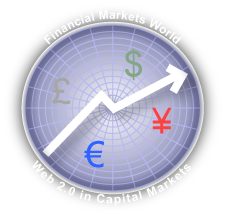 Financial Markets World held its conference, Web 2.0/Enterprise 2.0 in the Capital Markets Industry, in New York City on 17 September 2007. Invited as a panelist on the bleeding edge track, “Web 3.0: Where Are We Going,” I nonetheless had time to scribble some notes to cover some of the sessions. Financial Markets World held its conference, Web 2.0/Enterprise 2.0 in the Capital Markets Industry, in New York City on 17 September 2007. Invited as a panelist on the bleeding edge track, “Web 3.0: Where Are We Going,” I nonetheless had time to scribble some notes to cover some of the sessions.
Enterprise 2.0 is being adopted by investment banks and the capital markets industry, but adoption is being dampened by two flies in the ointment: 1) the industry is highly regulated, and compliance forces firms to have control of their data, which means CIOs are hesitant to try new technology that may introduce risk; 2) enterprise 2.0 doesn’t yet have a locked and loaded business case. It’s early, and all conference sessions reflected that.
The Global Human Capital Journal’s coverage comprises summaries of all the sessions, as well as more in-depth coverage of three of the sessions. To access all the articles in one click, use the Financial Markets World tag. This article contains the summaries as well as my analysis and conclusions of […]
A Glimpse Inside the Emerging Divide between Wall Street Professionals—How Many Goldman Employees Are on Facebook?
 The Global Human Capital Journal’s coverage of Financial Markets World’s Web 2.0 in the Capital Markets Industry conference continues. In this session, Tom Steinthal of the BSG Alliance wrapped the conference by crystallizing several Web 2.0 concepts with passion and panache. Tom is Managing Director of BSG Alliance’s Financial Services practice. Previously he has managed equities technology teams at Goldman Sachs, Donaldson, Lufkin & Jenrette, Credit Suisse, JPMorgan Chase and Prudential. Further back, he led Nasdaq technology teams and designed and implemented Nasdaq trade order management and market making systems. He has been a member of various Nasdaq and NASD technology committees and has been Series 7, 3 and 55 licensed. The Global Human Capital Journal’s coverage of Financial Markets World’s Web 2.0 in the Capital Markets Industry conference continues. In this session, Tom Steinthal of the BSG Alliance wrapped the conference by crystallizing several Web 2.0 concepts with passion and panache. Tom is Managing Director of BSG Alliance’s Financial Services practice. Previously he has managed equities technology teams at Goldman Sachs, Donaldson, Lufkin & Jenrette, Credit Suisse, JPMorgan Chase and Prudential. Further back, he led Nasdaq technology teams and designed and implemented Nasdaq trade order management and market making systems. He has been a member of various Nasdaq and NASD technology committees and has been Series 7, 3 and 55 licensed.
Wall Street firms will increasingly get caught up in several threads of culture change, but he emphasized two: the generational divide and, related to it, collaboration vs. control. In this context, “building an enterprise 2.0 system ’employees’ will use” must take into account very different styles of working and […]
Leadership, Trust and the Globally Integrated Enterprise reports on IBM’s CEO as he articulated a prescient vision for the enterprise—adapting to the Knowledge Economy.
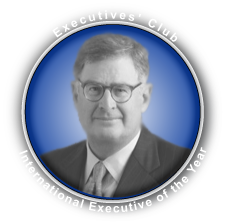 Samuel J. Palmisano, Chairman, President and Chief Executive Officer of IBM Corporation, outlined a new version of the enterprise at a lunch honoring him with the Executives’ Club of Chicago’s Thirteenth Annual International Executive of the Year Award April 12, 2007 at the Chicago Hilton. Entitled “Leadership, Trust and the Globally Integrated Enterprise,” his speech emphasized key points from his Summer 2006 article of the same name in Foreign Affairs. He was especially interesting to hear due to his experience with leading one of the world’s foremost global enterprises as well as his insight from serving global enterprises in every industry. Samuel J. Palmisano, Chairman, President and Chief Executive Officer of IBM Corporation, outlined a new version of the enterprise at a lunch honoring him with the Executives’ Club of Chicago’s Thirteenth Annual International Executive of the Year Award April 12, 2007 at the Chicago Hilton. Entitled “Leadership, Trust and the Globally Integrated Enterprise,” his speech emphasized key points from his Summer 2006 article of the same name in Foreign Affairs. He was especially interesting to hear due to his experience with leading one of the world’s foremost global enterprises as well as his insight from serving global enterprises in every industry.
Yesterday’s model for the global enterprise, the multinational corporation (MNC), looks increasingly outdated due to widespread adoption of standards-based technology, increasingly standardized work processes and a liberalizing regulatory environment. Today, knowledge-based resources are available globally, and the enterprise’s means to create value is choosing how and where to tap the resources to […]
Visions for Technology Leadership
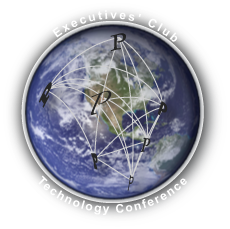 After Gary Forsee’s luncheon address, a diverse panel of executives took the stage to discuss global technology leadership. Hardik Bhatt, CIO of the City of Chicago, Steve Goldman, Director of Architecture, the Chicago Mercantile Exchange, Raymond Spencer, CEO of Kanbay International, and David Weick, Global CIO of McDonald’s, shared their visions for Chicago’s global role in the world. Janet Kennedy, Midwest General Manager of Microsoft, gracefully moderated the panel discussion. The Executives’ Club of Chicago’s quarterly Technology Conference took place March 8 at the Chicago Hilton. After Gary Forsee’s luncheon address, a diverse panel of executives took the stage to discuss global technology leadership. Hardik Bhatt, CIO of the City of Chicago, Steve Goldman, Director of Architecture, the Chicago Mercantile Exchange, Raymond Spencer, CEO of Kanbay International, and David Weick, Global CIO of McDonald’s, shared their visions for Chicago’s global role in the world. Janet Kennedy, Midwest General Manager of Microsoft, gracefully moderated the panel discussion. The Executives’ Club of Chicago’s quarterly Technology Conference took place March 8 at the Chicago Hilton.
“Getting global” can mean many things, and panelists hit the issue from many directions. I’ll venture that, more than anything, it means changing one’s mindset, focus and approach, all of which are difficult to measure. All panelists represented organizations that had had international operations for decades, so how is global different?
[…]
|
|
 The Global Human Capital Journal’s coverage of the Forrester Consumer Forum 2007 continues with this session on social tagging. Before your eyes glaze over, bear with me and learn how this simple, revolutionary social technology can help your customers to help your business. Forrester’s Sarah Rotman Epps moderated a discussion with Brian Rosenblat, Online Retail Industry Lead, Endeca Technologies and Jay Shaffer, Vice President Marketing, PowerReviews, who represented companies that offer social tagging solutions, and they all shared numerous examples.
The Global Human Capital Journal’s coverage of the Forrester Consumer Forum 2007 continues with this session on social tagging. Before your eyes glaze over, bear with me and learn how this simple, revolutionary social technology can help your customers to help your business. Forrester’s Sarah Rotman Epps moderated a discussion with Brian Rosenblat, Online Retail Industry Lead, Endeca Technologies and Jay Shaffer, Vice President Marketing, PowerReviews, who represented companies that offer social tagging solutions, and they all shared numerous examples.
 In 2007, nary an RSS feed or the page of a newspaper (for those still inclined ,^) does not mention China’s exploding impact on the global stage: China is truly an economic supernova, and it is breaking almost any record for development that is laid before it. However, China’s breakneck development is accompanied by grave environmental fallout: for example, as the host of the Beijing 2008 Olympic Games, the city is designing extreme measures to ensure that the air is clean enough for the athletes to breathe. The chief culprit is coal, a key source for China’s insatiable need for electric power, and a resource that the country has in abundance. For key facts on China, I suggest The Economist’s Country Briefing or CSRA’s Emerging Markets category (in depth) or China tag (mentions).
In 2007, nary an RSS feed or the page of a newspaper (for those still inclined ,^) does not mention China’s exploding impact on the global stage: China is truly an economic supernova, and it is breaking almost any record for development that is laid before it. However, China’s breakneck development is accompanied by grave environmental fallout: for example, as the host of the Beijing 2008 Olympic Games, the city is designing extreme measures to ensure that the air is clean enough for the athletes to breathe. The chief culprit is coal, a key source for China’s insatiable need for electric power, and a resource that the country has in abundance. For key facts on China, I suggest The Economist’s Country Briefing or CSRA’s Emerging Markets category (in depth) or China tag (mentions). Gaming and virtual worlds like Second Life have been a hot topic due to their novelty and, where gaming is concerned, their Gen X and Gen Y demographics. However, early adopter marketers who have flocked to virtual worlds to create presences there have often been disappointed. Forrester’s Paul Jackson is a long-time follower of gaming and virtual worlds, and he gave a fascinating and valuable session on the status and best practices for how marketers can approach this new medium. He also gave a rough ROI picture of investing. Just like anything, if you approach virtual worlds with appropriate goals, you can benefit significantly.
Gaming and virtual worlds like Second Life have been a hot topic due to their novelty and, where gaming is concerned, their Gen X and Gen Y demographics. However, early adopter marketers who have flocked to virtual worlds to create presences there have often been disappointed. Forrester’s Paul Jackson is a long-time follower of gaming and virtual worlds, and he gave a fascinating and valuable session on the status and best practices for how marketers can approach this new medium. He also gave a rough ROI picture of investing. Just like anything, if you approach virtual worlds with appropriate goals, you can benefit significantly. James W. Owens, Chairman and Chief Executive Officer of Caterpillar Inc., beseeched U.S. business and government leaders to find the courage to save free trade. The speaker at the Executives’ Club of Chicago’s Global Leaders Series, Owens addressed a packed house at the Hilton Chicago on 16 October 2007. His speech was immediately followed by the Club’s Technology Conference at which CIOs advised their peers on the emerging role of the CIO in the “networked economy 2.0.”
James W. Owens, Chairman and Chief Executive Officer of Caterpillar Inc., beseeched U.S. business and government leaders to find the courage to save free trade. The speaker at the Executives’ Club of Chicago’s Global Leaders Series, Owens addressed a packed house at the Hilton Chicago on 16 October 2007. His speech was immediately followed by the Club’s Technology Conference at which CIOs advised their peers on the emerging role of the CIO in the “networked economy 2.0.” The Global Human Capital Journal’s coverage of the Forrester Consumer Forum 2007 continues with this session on the disruptive power of customers’ Web 2.0 activity. Charlene Li, Vice President and Principal Analyst, Forrester Research, briefed the conference on the disruptive character of consumer empowerment, which she and Josh Bernoff call “groundswell.” She explained why customers were revolting, a “ladder of participation” to describe who is driving the change and some suggestions for turning revolt into reform.
The Global Human Capital Journal’s coverage of the Forrester Consumer Forum 2007 continues with this session on the disruptive power of customers’ Web 2.0 activity. Charlene Li, Vice President and Principal Analyst, Forrester Research, briefed the conference on the disruptive character of consumer empowerment, which she and Josh Bernoff call “groundswell.” She explained why customers were revolting, a “ladder of participation” to describe who is driving the change and some suggestions for turning revolt into reform. Financial Markets World held its conference, Web 2.0/Enterprise 2.0 in the Capital Markets Industry, in New York City on 17 September 2007. Invited as a panelist on the bleeding edge track, “Web 3.0: Where Are We Going,” I nonetheless had time to scribble some notes to cover some of the sessions.
Financial Markets World held its conference, Web 2.0/Enterprise 2.0 in the Capital Markets Industry, in New York City on 17 September 2007. Invited as a panelist on the bleeding edge track, “Web 3.0: Where Are We Going,” I nonetheless had time to scribble some notes to cover some of the sessions. The Global Human Capital Journal’s coverage of Financial Markets World’s Web 2.0 in the Capital Markets Industry conference continues. In this session, Tom Steinthal of the BSG Alliance wrapped the conference by crystallizing several Web 2.0 concepts with passion and panache. Tom is Managing Director of BSG Alliance’s Financial Services practice. Previously he has managed equities technology teams at Goldman Sachs, Donaldson, Lufkin & Jenrette, Credit Suisse, JPMorgan Chase and Prudential. Further back, he led Nasdaq technology teams and designed and implemented Nasdaq trade order management and market making systems. He has been a member of various Nasdaq and NASD technology committees and has been Series 7, 3 and 55 licensed.
The Global Human Capital Journal’s coverage of Financial Markets World’s Web 2.0 in the Capital Markets Industry conference continues. In this session, Tom Steinthal of the BSG Alliance wrapped the conference by crystallizing several Web 2.0 concepts with passion and panache. Tom is Managing Director of BSG Alliance’s Financial Services practice. Previously he has managed equities technology teams at Goldman Sachs, Donaldson, Lufkin & Jenrette, Credit Suisse, JPMorgan Chase and Prudential. Further back, he led Nasdaq technology teams and designed and implemented Nasdaq trade order management and market making systems. He has been a member of various Nasdaq and NASD technology committees and has been Series 7, 3 and 55 licensed. Samuel J. Palmisano, Chairman, President and Chief Executive Officer of IBM Corporation, outlined a new version of the enterprise at a lunch honoring him with the Executives’ Club of Chicago’s Thirteenth Annual International Executive of the Year Award April 12, 2007 at the Chicago Hilton. Entitled “Leadership, Trust and the Globally Integrated Enterprise,” his speech emphasized key points from his Summer 2006 article of the same name in Foreign Affairs. He was especially interesting to hear due to his experience with leading one of the world’s foremost global enterprises as well as his insight from serving global enterprises in every industry.
Samuel J. Palmisano, Chairman, President and Chief Executive Officer of IBM Corporation, outlined a new version of the enterprise at a lunch honoring him with the Executives’ Club of Chicago’s Thirteenth Annual International Executive of the Year Award April 12, 2007 at the Chicago Hilton. Entitled “Leadership, Trust and the Globally Integrated Enterprise,” his speech emphasized key points from his Summer 2006 article of the same name in Foreign Affairs. He was especially interesting to hear due to his experience with leading one of the world’s foremost global enterprises as well as his insight from serving global enterprises in every industry. After Gary Forsee’s luncheon address, a diverse panel of executives took the stage to discuss global technology leadership. Hardik Bhatt, CIO of the City of Chicago, Steve Goldman, Director of Architecture, the Chicago Mercantile Exchange, Raymond Spencer, CEO of Kanbay International, and David Weick, Global CIO of McDonald’s, shared their visions for Chicago’s global role in the world. Janet Kennedy, Midwest General Manager of Microsoft, gracefully moderated the panel discussion. The Executives’ Club of Chicago’s quarterly Technology Conference took place March 8 at the Chicago Hilton.
After Gary Forsee’s luncheon address, a diverse panel of executives took the stage to discuss global technology leadership. Hardik Bhatt, CIO of the City of Chicago, Steve Goldman, Director of Architecture, the Chicago Mercantile Exchange, Raymond Spencer, CEO of Kanbay International, and David Weick, Global CIO of McDonald’s, shared their visions for Chicago’s global role in the world. Janet Kennedy, Midwest General Manager of Microsoft, gracefully moderated the panel discussion. The Executives’ Club of Chicago’s quarterly Technology Conference took place March 8 at the Chicago Hilton.